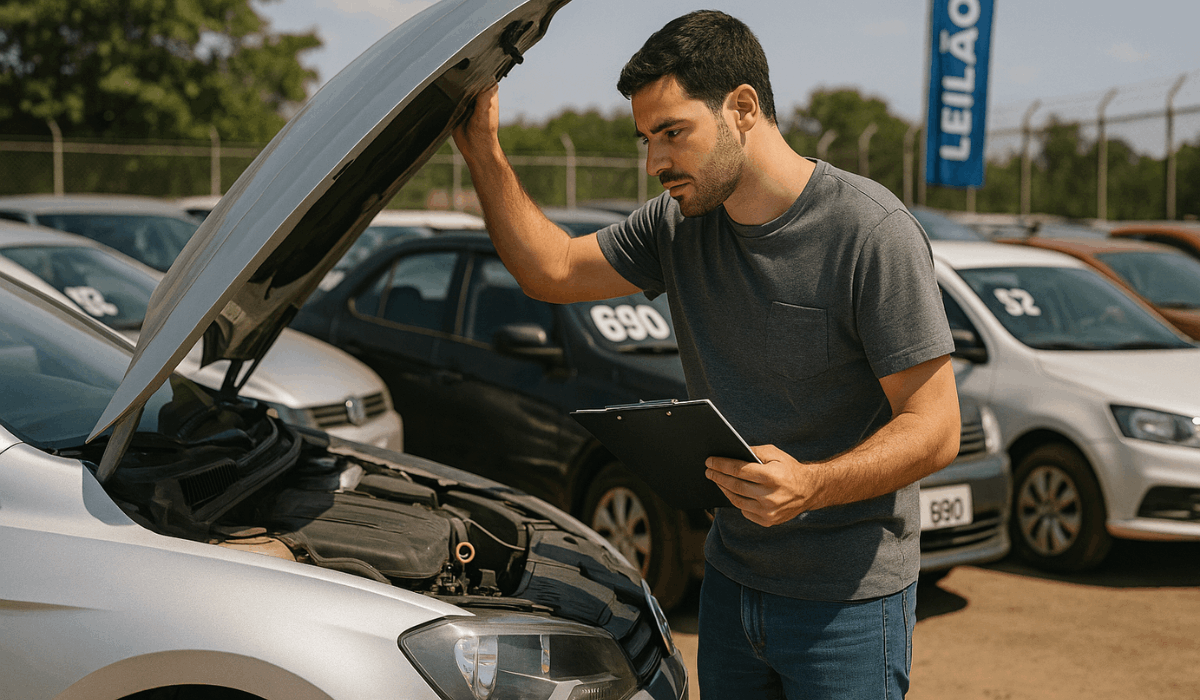Car auctions in Brazil have become a smart way to buy vehicles at lower prices.
Many people now use these auctions to find good deals or invest in cars for resale.
This guide explains how the process works, how you can participate safely, and what to expect before and after placing a bid.
How Car Auctions Work in Brazil
Car auctions in Brazil follow clear steps that define how the entire process works from start to finish.
Understanding each stage helps you bid confidently and avoid legal or financial issues. Below is a straightforward breakdown of how it works.
- Vehicle Listing: Cars are listed by banks, Detran, or insurers, each with photos, ID number, and condition report.
- Publication of the Edital: The auction’s official notice (called edital) is released with all rules, payment terms, and inspection details.
- Registration: Interested buyers register online or in person, submitting their CPF, ID, and proof of residence to verify identity.
- Inspection: Before the auction, participants can inspect the vehicles in person or view photos and condition reports online.
- Bidding Phase: During the auction, buyers place bids in real time, and the highest bid at closing wins the vehicle.
- Payment: The winner must pay the bid amount plus administrative fees, taxes, and commissions, usually within 1–3 business days.
- Transfer and Pickup: After payment, the buyer gets documents to transfer ownership at Detran and collect the car.
Main Types of Car Auctions
Car auctions in Brazil vary by organizer and sale method. Knowing each type helps you choose safely and effectively.
- Judicial Auctions: Held by courts to sell vehicles seized in legal cases or unpaid debts. Usually offer lower prices but limited inspection options.
- Bank and Finance Auctions: Run by banks to sell repossessed cars, often newer and well-documented.
- Insurance or Salvage Auctions: Include vehicles recovered from accidents or total loss claims, sold “as is.” Ideal for mechanics or resellers.
- Government Auctions: Managed by public agencies such as Detran or federal departments to sell decommissioned or seized vehicles.
- Online Auctions: Fully digital events where bidding happens through verified websites, allowing participation from anywhere in Brazil.

Step-by-Step Guide to Participate
Joining a car auction in Brazil is simple if you follow each step carefully. The process requires registration, verification, and quick payment after winning.
Here’s a clear step-by-step guide to help you participate correctly.
- Register Online: Create an account on the official auction website and provide your CPF, ID, and proof of residence.
- Read the Edital: Review all rules, fees, deadlines, and payment terms listed in the official notice.
- Inspect the Vehicle: Check the car’s photos, reports, or visit in person if allowed to assess its condition.
- Place Your Bid: Participate in the live or online auction and submit your bid within the set timeframe.
- Confirm Payment: Pay the full amount plus administrative fees within 1–3 business days.
- Transfer Ownership: Use the provided documents to complete the ownership transfer through Detran.
- Collect the Vehicle: Schedule and pick up your car once payment and paperwork are verified.
Costs, Fees, and Documentation
Car auctions in Brazil include several mandatory costs that go beyond your winning bid.
Knowing these amounts helps you calculate the real price before you buy.
Below is a list of the most common fees, taxes, and documentation requirements you’ll face.
- Winning Bid: The price you offer and win with — this is your base cost.
- Administrative Fee: Charged by the auctioneer, usually 5% to 10% of the winning bid.
- Leiloeiro Commission: A standard 5% service fee set by official regulations.
- Detran Transfer Fee: Around R$ 350 to R$ 450, depending on the state, for ownership transfer and registration update.
- IPVA (Vehicle Tax): If unpaid, the buyer must pay the remaining year’s IPVA, which varies by state (about 2%–4% of the car’s value).
- DPVAT Insurance: Usually between R$ 5 and R$ 20, depending on the type of vehicle.
- Pending Fines: Must be settled before ownership transfer; amounts vary based on the record.
- Inspection or Vistoria Fee: Approximately R$ 150 to R$ 250, required before licensing.
- Transport or Towing Cost: Between R$ 200 and R$ 600, depending on distance and vehicle condition.
- Required Documents: CPF, RG or CNH, proof of residence (recent utility bill), and proof of payment for all auction and Detran fees.

Important Tips and Cautions
Car auctions offer good deals but carry risks. Verifying details and staying cautious helps you avoid scams and losses.
- Verify the Auctioneer: Make sure the auction house is registered with JUCESP or the state’s Detran.
- Check the Vehicle History: Use the Renavam number on the Detran website to confirm if there are fines, liens, or theft records.
- Read the Edital Carefully: All rules, payment terms, and vehicle conditions are stated in the official notice — never skip this.
- Inspect Before Bidding: Always view the car in person or analyze photos and reports carefully to check for damage.
- Beware of Fake Websites: Confirm that the site uses https:// and shows contact details of the licensed auctioneer.
- Avoid Emotional Bidding: Set a maximum price before the auction and don’t exceed your budget.
- Know the Payment Terms: Payments are usually due within 24 to 72 hours, and delays can cause cancellation.
- Understand “As Is” Sales: Cars are sold without warranty or test drives — repairs are the buyer’s responsibility.
Who Should Consider Buying at Auction
Car auctions fit specific buyers who understand the process and risks. Here are the profiles best suited for this type of purchase.
- Budget Buyers: Those looking for cars below market value and willing to handle minor repairs.
- Mechanics and Resellers: Professionals who can fix vehicles and resell them for profit.
- Fleet Owners: Businesses expanding vehicle fleets at a lower cost.
- First-Time Buyers: Individuals seeking affordable options with proper research and caution.
- Investors: Buyers interested in purchasing multiple cars for resale or rental purposes.
- Car Enthusiasts: People looking for unique models, older cars, or rare finds often find them in auctions.
What Happens After Winning the Auction
Winning a car at auction is only the beginning. You’ll still need to complete payment, handle paperwork, and arrange pickup.
Here’s what happens after you win the auction.
- Payment Confirmation: Pay the full amount plus fees within the deadline, usually 1 to 3 business days.
- Receipt of Documents: The auction house provides a purchase invoice and transfer documents once payment is cleared.
- Detran Transfer: Submit the documents to Detran to transfer ownership and register the vehicle under your name.
- Vehicle Pickup: Schedule collection from the auction yard or storage lot after clearance.
- Inspection (Vistoria): Conduct a mandatory inspection at an authorized center before using or reselling the car.
- Tax and Fee Settlement: Ensure IPVA, DPVAT, and any fines are paid to avoid registration delays.
- Maintenance or Repair: Inspect the car’s condition and perform necessary fixes before regular use.
To Conclude
Car auctions in Brazil offer great opportunities for those who plan carefully and act responsibly.
By understanding the process, costs, and legal steps, you can buy safely and avoid common mistakes.
Start exploring official auction websites today and make your next car purchase with confidence.









